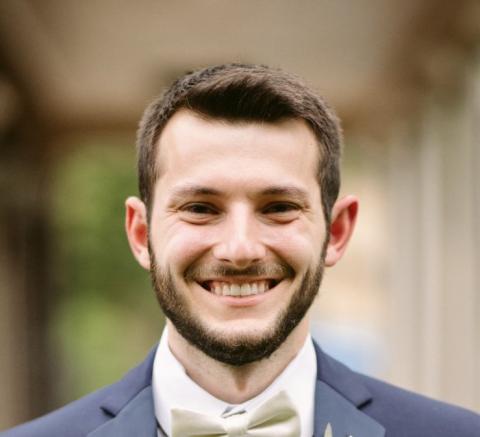Accounting is an ever-changing field as laws and regulations shift and technology evolves. Maintaining an appetite and aptitude for lifelong learning can be a muscle.
For years, future CPAs and leaders have trained and toned those muscles by earning a Master of Science in Accounting degree at the University of Louisiana at Lafayette. The accounting master’s program is now 100% online to give students more flexibility in balancing full-time work schedules, CPA preparation, and graduate coursework.
The Right Pace
Trevor Bellard graduated with his bachelor’s in accounting from UL Lafayette’s B.I. Moody III College of Business Administration in 2015.
He immediately became a full-time employee and graduate student, finishing his Master of Science degree in Accounting in only three semesters. Some courses were online or hybrid, giving Bellard insight into the flexibility of online learning.
“I wish more courses had been online,” he says. “That would have been convenient because I was working full-time while going through the program.”
Students enrolling in the online M.S. in Accounting take accelerated, eight-week courses, allowing them to focus on fewer courses while earning their degree at the pace they need to meet their personal and professional goals.
Laura Guichard, ‘17, became passionate about research through the master’s in accounting program — her second master’s degree in business.
During her time at UL Lafayette, she had the opportunity to take one graduate course online.
“It was still a lot of work, and you have to meet the deadlines, but you could work at your own pace,” she says. “It was just really nice. Especially if you were studying for the CPA, it was just really good time management-wise.”
UL Lafayette’s AACSB-accredited accounting program was already well-designed for working professionals, she says. The online format continues that tradition.
“It’s beneficial for graduating seniors in accounting who need to obtain their remaining required hours but also want to start making money,” she says.
“They’re putting a lot on their plate, and this program is really designed — especially since it’s going online — to give students the time they’d need to not only get the hours they need for the CPA exam, but also give them time to make their own study plan for the CPA.”
Preparing for the CPA
Following graduation, Bellard was hired as a staff accountant for tax firm Singleton, Kellner, Bolding, Avant & Associates, LLC. Knowing he wanted to reach the requisite 150 academic credit hours needed to take the CPA exam, Bellard considered which path would give him the best professional edge.
“It was more beneficial for me to get a master’s degree rather than take 20 hours of pointless classes,” he says. “I wanted to further my knowledge in the field and felt like that would give me an advantage on the CPA exam.”
Refining his understanding of accounting principles, systems, and research paid off, he says.
“It prepared me well,” he says. “I had a more conceptual understanding. If I had questions about things being presented, I was able to quickly research the issue and figure out exactly what they were asking. In the master’s program, we had to do quite a bit of research so I was very comfortable researching issues later.”
From Theory to Practice
Guichard says UL Lafayette’s accounting program is known for its rigor.
That remains true at the graduate level, she says.
“Unlike the undergraduate degree, which is very exam-based, the rigor is still there but it’s directed toward developing research skills and how to apply what you’ve learned in the undergraduate program with your clients,” Guichard says.
Developing those research skills serves graduates well in their accounting careers.
“Tax law is always changing,” she says. “You have to keep up with changing laws, and continue your professional education.”
For Guichard, it also guided her career path. She knew she enjoyed teaching when she enrolled in the accounting program, but her love of research led her to pursue a life in academia. She’s now a third-year doctoral student.
“It wasn’t until the master’s in accounting program that I learned what the research aspect was and found I loved it just as much as teaching,” she says. “Teaching gives you immediate satisfaction, but the research part could go for years.”
Bellard says he’s using what he learned in graduate school every day as a CPA.
“You have to be able to recognize when there’s an issue and know how to research the issue and find the correct answer,” he says. “The advanced tax class helped in more ways I can count. I’m dealing with tax issues every day so that deeper knowledge of tax law really helps.”
Building Support
Good public accountants and auditors don’t just need to be well-versed in tax law and regulations, they need to know how to communicate and who the other experts in the field are.
“You have to be able to talk to clients and to work as a team. A lot of people don’t realize that with auditing, it’s a lot of teamwork,” says Guichard, who interned with Ernst & Young. “In the master’s program, it was such a diverse group. It was really cool to meet another group of accounting friends that I’m still in touch with today.”
Bellard says getting involved in accounting organizations helped him create a cohort of peer mentors.
“You meet like-minded individuals,” he says. “I can still lean on them or reach out to them if something comes up that I’m not sure how to do in my job, because they have different specialties than I do.
“We can all lean on each other.”